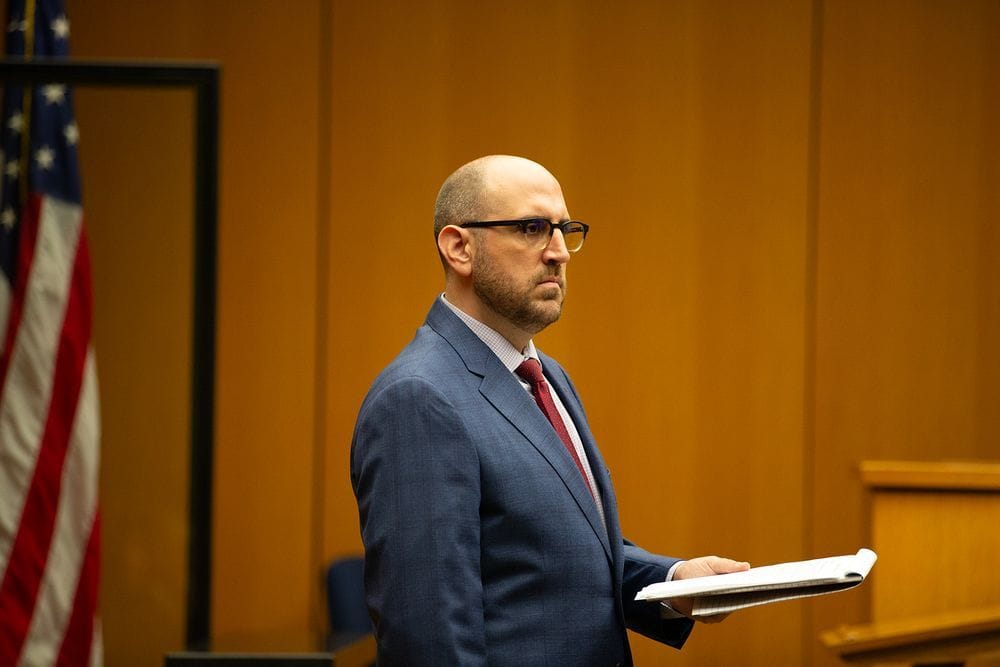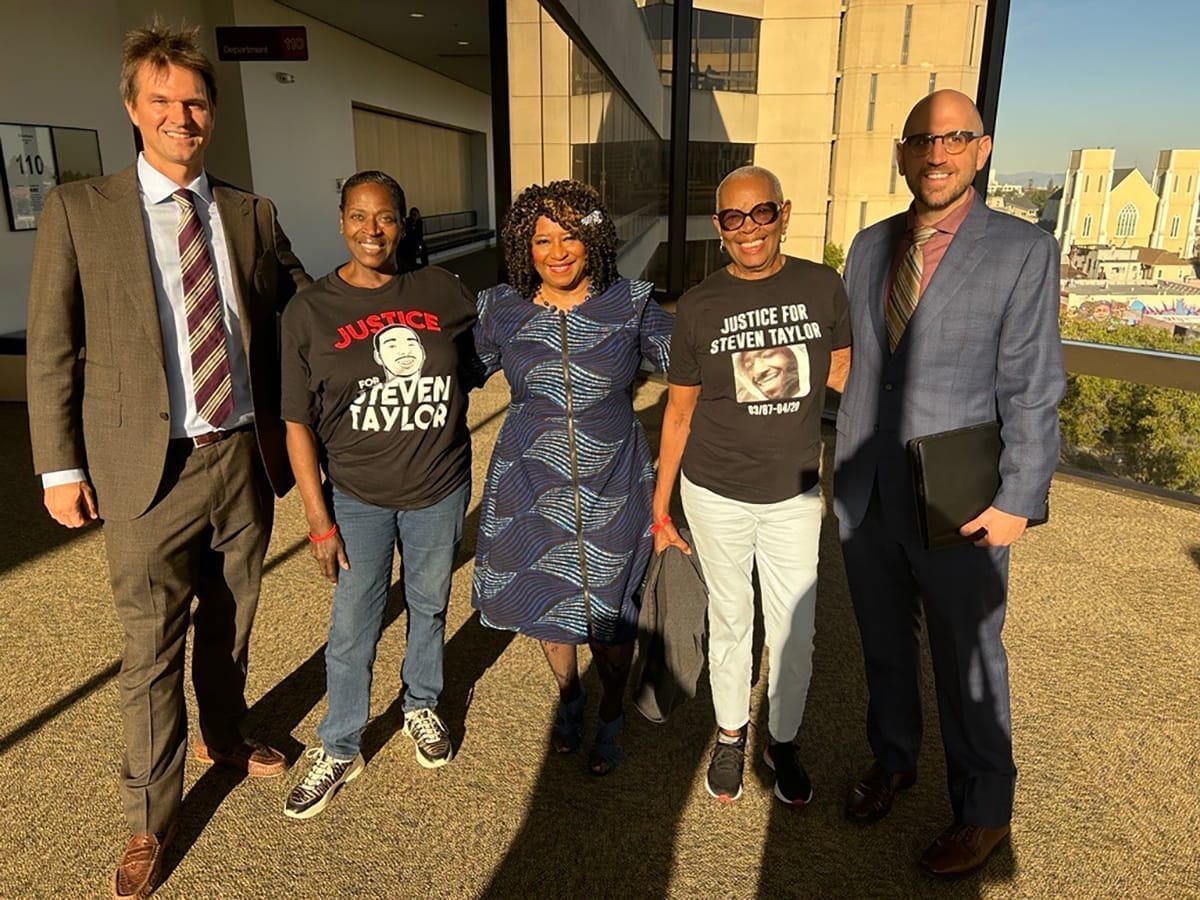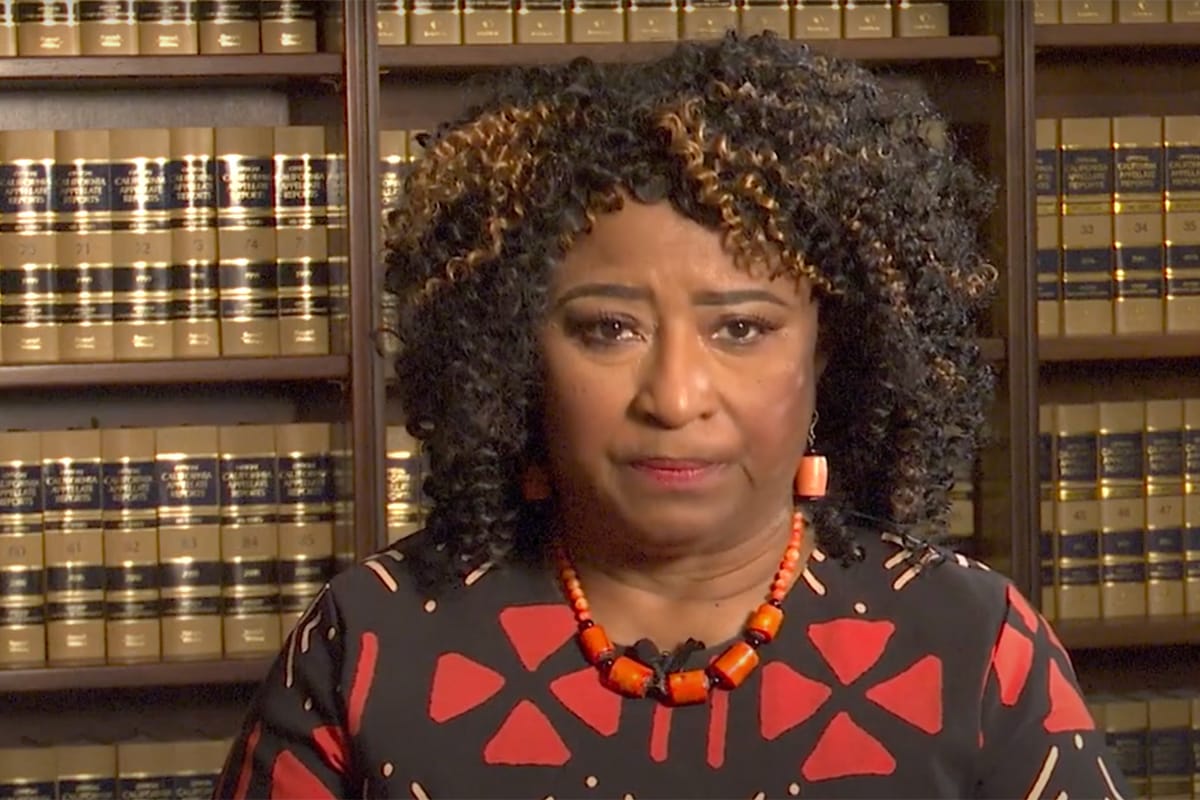


A new defense motion has raised serious ethical questions about whether the prosecution, under recalled DA Pamela Price, mishandled a high-profile police shooting case before being recused from it altogether due to bias.
Attorney Michael Rains, who represents former San Leandro police officer Jason Fletcher, says the prosecution failed to turn over potentially exculpatory material — which could mean trouble for the case in the future.
The case centers around the fatal shooting of Steven Taylor in the San Leandro Walmart in April 2020.
Fletcher is now facing criminal and civil charges in connection with the shooting, including a $10 million lawsuit from Taylor’s family.
The criminal case was charged before Price took office, but she campaigned on it and brought on former public defender Zachary Linowitz to oversee the matter as part of a Public Accountability Unit focused on police corruption and misconduct.
According to this week’s filing, Fletcher’s attorney received new reports from the DA’s office this month about three use-of-force experts who were contacted by Linowitz about the Fletcher case.
One of them “told Linowitz that he did not believe the conduct of Fletcher supported a ‘criminal case,'” to which Linowitz reportedly told him: “You were my last hope,” according to the filing.
The expert, who was not named, told Linowitz “he’d find somebody who would tell him what he wanted to hear” if he kept “shopping around,” but said he “didn’t believe that would serve him (Linowitz) well in front of a jury,” Rains wrote.

On Thursday, Linowitz called the claims “categorically false” and said the case against Fletcher was “solid.”
Linowitz said he did not make the statements as described in the filing, which he said also mischaracterized the evidence.
“They’re cooking up a nonexistent scandal in order to have cover for dismissing a legitimate case,” he said. “It is 100% not true.”
Linowitz left the DA’s office in early February, a few months after Price’s recall, to open his own firm with a civil rights and social justice focus.
Linowitz told TBS he had uncovered a “wealth of evidence” and engaged “numerous experts” while he was assigned to the Fletcher case, including one who had been “clearly disapproving” of Fletcher’s conduct, calling it out of line with policy and general police practices.
In June, Linowitz sent a letter to the new administration offering to share his findings and background on the case to support “continuity and fairness” in the prosecution.
They never responded.
Linowitz said that had been disappointing — but that he was still more than willing to discuss his work on the case with anyone at the DA’s office.
“I just wanted to get justice for this family, whatever that means,” he said, “following the law, being diligent, ignoring pressure from shifting political winds.”
“I was there to do a job,” he added. “I am committed to police reform and accountability.”
Prosecutors have “a much different obligation”
Months before her recall, the DA’s office under Price had already faced judicial rebuke resulting in office-wide recusal over its approach to the Fletcher case, mostly due to Price’s conduct.
But Linowitz was also implicated.
According to the state attorney general’s office, both Price and Linowitz “failed to stay within the appropriate guardrails of commenting publicly about a pending case, causing a seriously grave conflict and raising concerns about whether they would provide defendant with due process.”
In his filing this week, Rains wrote that Linowitz had been assigned to the Fletcher case throughout 2023 and 2024 but never shared anything with the defense to indicate multiple use-of-force experts had raised questions about the criminal case.
In the wake of this week’s filing, several legal experts said that could be a problem.
That’s because prosecutors are required to turn over potentially exculpatory material, also known as Brady material, when they find it.
The term comes from the 1963 Supreme Court ruling that found that the failure to turn over evidence favorable to the defense is a violation of due process.
“Brady put it into sharp focus. But that’s always been the law,” one longtime defense attorney said Thursday. “The district attorney has an obligation to seek justice and to seek the truth — not to win cases.”
He noted that many people who had been hired under Pamela Price had come from the civil side or public defender’s offices.
“That’s a much different obligation than as a public prosecutor,” he added.
Other experts agreed.
“You can’t play ‘hide the ball,'” said Norbert Chu, speaking generally Thursday about the ethical duties of a prosecutor. “Any kind of exculpatory evidence, we are obligated to give it over to the defense.”
Chu was an Alameda County prosecutor for 35 years before he retired in 2017 under Price’s predecessor, Nancy O’Malley.
Chu said even informal conversations with experts who consistently express doubt about the ability to prove criminal charges would need to be turned over.
“If all three experts independently came to the same conclusion, that this is not a crime, that it was not an illegal use of force, you can’t sit on it,” he said.
He continued: “If, in fact, he goes to three experts, even informally, and they’re all saying ‘it’s not there,’ then the proper response would have been to dismiss the case.”
That does not mean there would be no penalties in a case like this, experts also noted, given that a civil lawsuit may well have a different outcome.
Civil court has a different standard of proof than a guilty finding, beyond a reasonable doubt, in a criminal case.
On Thursday, Linowitz said he had a deep appreciation for the prosecutor’s duty to disclose — and said the DA’s office should have contacted him for clarification if there were any questions about “the state of the file.”
“They were digging for dirt and created inferences that are flawed,” he said, adding that he wouldn’t be surprised to see the Fletcher case quietly dropped, at some point in the future, due to what he saw as baseless claims.
“That’s what they did in San Francisco, when Brooke [Jenkins] became DA,” he said.
In his motion this week, Rains asked the court to postpone Fletcher’s next court date from July 25 until after both sides can review a new report, expected in August, from one of the experts Linowitz consulted whose opinion did not support an involuntary manslaughter conviction in the case.
Fletcher was charged in 2020 and entered a plea of not guilty.
Stay tuned for ongoing coverage.
Related coverage
With Price gone, new Alameda DA should oversee fatal police shooting case, AG says
Under Pamela Price, the courts recused her office twice in less than three months from high-profile cases. Such extreme remedies are rare.

Alameda County DA recused from fatal police shooting case
It’s the second time this year that the Alameda County DA’s office under Pamela Price has been recused from a case.





